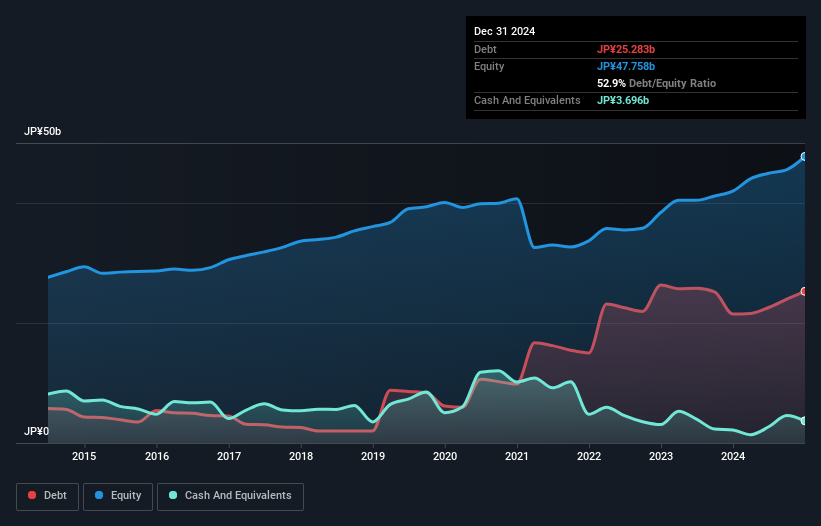These 4 Measures Indicate That Fuji Pharma (TSE:4554) Is Using Debt Extensively

Some say volatility, rather than debt, is the best way to think about risk as an investor, but Warren Buffett famously said that 'Volatility is far from synonymous with risk.' It's only natural to consider a company's balance sheet when you examine how risky it is, since debt is often involved when a business collapses. As with many other companies Fuji Pharma Co., Ltd. (TSE:4554) makes use of debt. But should shareholders be worried about its use of debt?
When Is Debt A Problem?
Debt and other liabilities become risky for a business when it cannot easily fulfill those obligations, either with free cash flow or by raising capital at an attractive price. Part and parcel of capitalism is the process of 'creative destruction' where failed businesses are mercilessly liquidated by their bankers. However, a more frequent (but still costly) occurrence is where a company must issue shares at bargain-basement prices, permanently diluting shareholders, just to shore up its balance sheet. Of course, the upside of debt is that it often represents cheap capital, especially when it replaces dilution in a company with the ability to reinvest at high rates of return. The first thing to do when considering how much debt a business uses is to look at its cash and debt together.
What Is Fuji Pharma's Debt?
The image below, which you can click on for greater detail, shows that at December 2024 Fuji Pharma had debt of JP¥25.3b, up from JP¥21.5b in one year. On the flip side, it has JP¥3.70b in cash leading to net debt of about JP¥21.6b.

How Strong Is Fuji Pharma's Balance Sheet?
Zooming in on the latest balance sheet data, we can see that Fuji Pharma had liabilities of JP¥38.3b due within 12 months and liabilities of JP¥8.23b due beyond that. Offsetting this, it had JP¥3.70b in cash and JP¥20.1b in receivables that were due within 12 months. So its liabilities total JP¥22.7b more than the combination of its cash and short-term receivables.
This is a mountain of leverage relative to its market capitalization of JP¥28.8b. Should its lenders demand that it shore up the balance sheet, shareholders would likely face severe dilution.
See our latest analysis for Fuji Pharma
We use two main ratios to inform us about debt levels relative to earnings. The first is net debt divided by earnings before interest, tax, depreciation, and amortization (EBITDA), while the second is how many times its earnings before interest and tax (EBIT) covers its interest expense (or its interest cover, for short). Thus we consider debt relative to earnings both with and without depreciation and amortization expenses.
We'd say that Fuji Pharma's moderate net debt to EBITDA ratio ( being 2.4), indicates prudence when it comes to debt. And its commanding EBIT of 22.6 times its interest expense, implies the debt load is as light as a peacock feather. Pleasingly, Fuji Pharma is growing its EBIT faster than former Australian PM Bob Hawke downs a yard glass, boasting a 109% gain in the last twelve months. When analysing debt levels, the balance sheet is the obvious place to start. But it is future earnings, more than anything, that will determine Fuji Pharma's ability to maintain a healthy balance sheet going forward. So if you're focused on the future you can check out this free report showing analyst profit forecasts .
But our final consideration is also important, because a company cannot pay debt with paper profits; it needs cold hard cash. So we always check how much of that EBIT is translated into free cash flow. Over the last three years, Fuji Pharma saw substantial negative free cash flow, in total. While that may be a result of expenditure for growth, it does make the debt far more risky.
Our View
We feel some trepidation about Fuji Pharma's difficulty conversion of EBIT to free cash flow, but we've got positives to focus on, too. For example, its interest cover and EBIT growth rate give us some confidence in its ability to manage its debt. Looking at all the angles mentioned above, it does seem to us that Fuji Pharma is a somewhat risky investment as a result of its debt. That's not necessarily a bad thing, since leverage can boost returns on equity, but it is something to be aware of. There's no doubt that we learn most about debt from the balance sheet. However, not all investment risk resides within the balance sheet - far from it. For instance, we've identified 3 warning signs for Fuji Pharma (2 are concerning) you should be aware of.
Of course, if you're the type of investor who prefers buying stocks without the burden of debt, then don't hesitate to discover our exclusive list of net cash growth stocks, today.
New: AI Stock Screener & Alerts
Our new AI Stock Screener scans the market every day to uncover opportunities.
• Dividend Powerhouses (3%+ Yield)
• Undervalued Small Caps with Insider Buying
• High growth Tech and AI Companies
Or build your own from over 50 metrics.
Have feedback on this article? Concerned about the content? Get in touch with us directly. Alternatively, email editorial-team (at) simplywallst.com.
This article by Simply Wall St is general in nature. We provide commentary based on historical data and analyst forecasts only using an unbiased methodology and our articles are not intended to be financial advice. It does not constitute a recommendation to buy or sell any stock, and does not take account of your objectives, or your financial situation. We aim to bring you long-term focused analysis driven by fundamental data. Note that our analysis may not factor in the latest price-sensitive company announcements or qualitative material. Simply Wall St has no position in any stocks mentioned.
About TSE:4554
Fuji Pharma
Engages in the research and development, manufacture, and marketing of pharmaceutical products in Japan and internationally.
Undervalued established dividend payer.
Market Insights
Community Narratives




